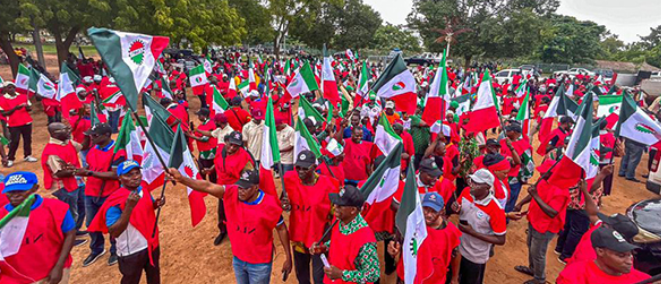By Peter Omopo
The Nigeria Labour Congress (NLC) and federal civil servants have called on the Federal Government to urgently review the national minimum wage, warning that the current ₦70,000 benchmark is no longer sustainable in the face of worsening economic hardship.
The demand comes after several states took bold steps to increase their minimum wages above the national threshold. On August 27, Imo State Governor, Hope Uzodinma, announced an upward review of workers’ salaries, raising the minimum wage to ₦104,000. Lagos State had earlier approved ₦85,000, with a promise to raise it to ₦100,000 in 2025, while Rivers, Bayelsa, Niger, Enugu, and Akwa Ibom have also introduced higher pay packages for their workforce.
Acting General Secretary of the NLC, Mr Benson Upah, told the News Agency of Nigeria (NAN) on Sunday in Abuja that inflation has eroded the value of ₦70,000, leaving workers unable to meet basic needs.
“The truth is that ₦70,000 is not sustainable under the present economic situation. Workers are under immense pressure, and unless the government responds quickly, the crisis of survival will only worsen,” Upah said.
He added that while the union would continue to pursue dialogue with government, industrial action may be considered if negotiations fail.
Similarly, President of the Association of Senior Civil Servants of Nigeria (ASCSN), Mr Shehu Mohammed, commended state governors who had revised their minimum wages, describing their actions as “a welcome development and an eye-opener” for the Federal Government. He noted that organised labour initially demanded ₦250,000 as a living wage during negotiations in 2024.
Civil servants interviewed by NAN also lamented that the current minimum wage no longer meets daily expenses. Mrs Kemi George, a federal worker, said:
“By the time I pay transport to work and buy food, nothing is left. Rent and school fees are almost impossible to cover.”
Another worker, Mr Obi Chimaobi, described the situation as “unbearable,” saying workers are “already in debt before the month even ends.”
Labour leaders further urged the Federal Government to pair wage reviews with broader policies on affordable housing, healthcare, electricity, and transportation to reduce the cost of living.
President Bola Tinubu had signed the National Minimum Wage (Amendment) Act into law in July 2024, raising the minimum wage from ₦30,000 to ₦70,000. The law applies to federal, state, and local governments, as well as the private sector.
However, with inflation surging and food, fuel, and housing costs rising sharply, unions insist that the wage no longer reflects economic realities.
“A well-paid workforce is a motivated workforce,” said civil servant Mrs Bola Akingbade. “When workers are financially secure, they are more productive, committed, and less prone to corrupt tendencies.”

